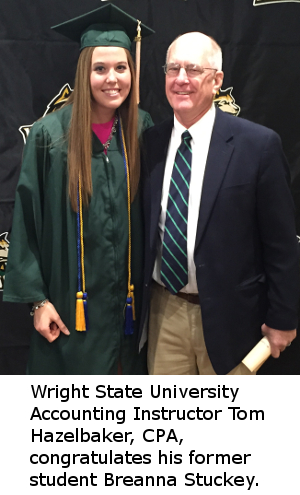A second act for Tom Hazelbaker, CPA: teaching
By Jennifer Rieman, CAE, manager, public relations
Tom Hazelbaker, CPA, didn’t plan on teaching accounting.
 “I retired from Clark Schaefer Hackett & Co. and intended to be a grandpa,” he said.
“I retired from Clark Schaefer Hackett & Co. and intended to be a grandpa,” he said.
But when Maggie Houston, CPA, MBA, CMA, CFM, senior lecturer of accountancy at Wright State University, suggested he consider it, he was receptive to the idea. Hazelbaker and Houston served together as trustees of The Ohio CPA Foundation. Four years later, he’s teaching full time at Wright State and enjoying every minute of it.
“I’m prepared, I’m ready for class and I look forward to it,” he said. “I love it.”
Hazelbaker estimates that up to 80% of the students in his Principals of Financial Accounting course are majoring in something other than accounting. The course is required for every business major at Wright State, but not all of the students are excited about being there.
His first class exercise shows students why the subject matters, even if they’re not accounting majors.
“I ask everyone to stand up, and I say sit down if you never plan to retire, if you plan to work to the grave,” he said. “And then I say, when you retire, if you plan on living only on social security, sit down.”
Not surprisingly, almost all of the students are still standing.
“Then I tell the students that they need to have some money to live on besides a social security check. They need to know how to invest, what a company is doing and what a company’s financial statements look like, so they can make evaluations on where to invest their money. That’s why they need the course.”
This straightforward approach continues through the third week of class, when Hazelbaker brings in his grandchildren’s toys to illustrate a point. The students run a mock business using a toy lawnmower, four-wheeler, stock certificates and blank note payables.
We sell stock, we borrow from the credit union, we get money to start a business and then we buy lawnmowers and supplies,” he said. “We go through starting a business visually, and everyone is doing something – it engages a class of 50 people.”
Throughout the course, he’s not above subtly and not-so-subtly encouraging his students to consider accounting. He brings in starting salary data for accountants and talks about his own career as former chair and president at Clark Schaefer Hackett.
He said many of his student evaluations include a similar theme—students initially thought they were going to hate accounting, but discovered they really like it and as a result, are thinking about changing their major.
Hazelbaker is adamant that more accounting professionals should consider teaching, especially after retirement, when there’s more time to focus on it.
“Students can see how I enjoyed my career and that I think accounting is interesting, which helps break the stereotype of what it means to be a CPA,” he said. “It attracts students to the profession if they see someone who likes it.”
Hazelbaker is fully present in the classroom, and his relationships with his students extend outside of school as well. When three international students on the varsity soccer team needed a stand-in for parent’s night, he was there.
Beyond his ability to form personal relationships with his students, his secret weapon in the classroom will always be his experience in public accounting.
“When a student asks a question, I can give five real-world examples to explain it to them,” he said. “I don’t live in a text book, I live in real-world experiences.”
